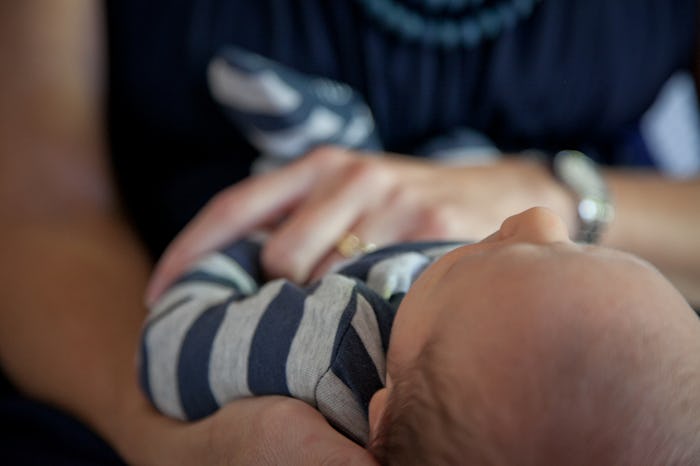Nothing is worse than a sick baby, mainly because they can't tell you what's wrong with them. So you have to put on your best Sherlock Holmes hat and try to figure out what's going on. There have recently been outbreaks of norovirus, or "the winter vomiting," going around, and babies, with their brand new immune systems, are at risk. Luckily, the signs of norovirus in babies are pretty obvious and easy to catch. Believe us, if your baby has norovirus you will know. We're talking diarrhea and vomiting for at least 24 hours before it lets up.
It can be absolutely miserable — especially if you're on clean up duty (which, of course, you are). The virus isn't serious, but dehydration is. When a child is puking and pooping for a few days straight, they're losing fluids. It's the epitome of being between the proverbial rock and hard place. You want the baby to be empty so it doesn't have anything left to expel, but they need fluids and nutrients to keep going.
For formula fed babies, you might want to think about eliminating dairy or soy products, since they can make diarrhea worse, and substituting Pedialyte to replace those electrolytes (no, blue Gatorade is not the same thing). Breastfed babies may be just fine on a regular feeding schedule, but you'll want to check with your pediatrician.
According to the Centers for Disease Control, the whole ordeal should all be over in 48 hours. But be careful — norovirus is crazy contagious and if you're changing diapers and nursing, you are at risk, too. The virus is in the vomit and the stool so if you're coming into contact with any of your baby's bodily fluids, you're in trouble.
Obviously, you're always washing your hands and dousing onesies in bleach on laundry day, but you're going to want to take extra precautions. The virus can stay on counters and tables and utensils (try not to think about it) so make sure you're wiping everything down, all the time. In fact, if you have a partner, just have them follow you around with bleach and hot water. (Obviously, don't do that, but you get the point.) To ensure you're really disinfecting, the CDC says that chlorine bleach is the only thing that kills the virus.
If your infant gives you the virus make sure you aren't preparing food, if possible, to avoid giving it to someone else (they won't like you for it, trust me).
It's not pretty, but, like all terrible things, it will pass. Just make sure baby is hydrated and don't touch anything. Piece of cake right?
